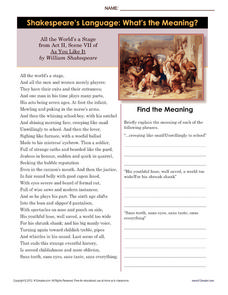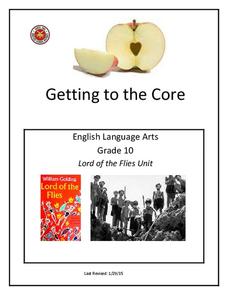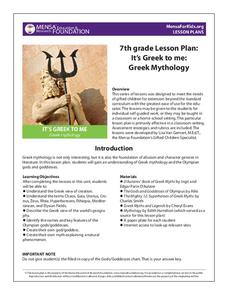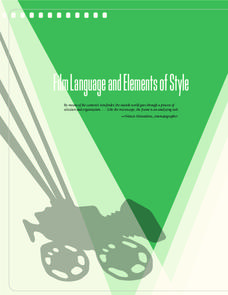K12 Reader
The Ransom of Red Chief
Readers identify the irony in the ransom note to Ebenezer Dorset and his reply as part of a reading comprehension activity using O. Henry's "The Ransom of Red Chief."
K12 Reader
National Symbols
What do the flag, the bald eagle, and the Statue of Liberty remind you of? After reading a short article about these national symbols, middle schoolers are asked to identify ideas that these items represent.
K12 Reader
Extreme Weather
What is thunder? After reading a short article about extreme weather, middle schoolers must use information in the text to explain this weather phenomenon.
K12 Reader
The Attack on Pearl Harbor
After reading a short passage about Japan's involvement in World War II and why the Japanese attacked Pearl Harbor, readers are asked to analyze how the attack effected the attitudes of Americans who previously had not wanted to go to war.
K12 Reader
Shakespeare's Language: What's the Meaning?
You needn't be an actor to stage this exercise in reading comprehension. Kids examine Jacques's "All the World's a Stage" speech from Act II, scene ii, of As You Like It, and explain the literal meaning of the figurative language. There...
K12 Reader
The Grand Canyon
After reading s short description of the Grand Canyon, readers demonstrate their ability to use context to determine the meaning of words in the passage.
K12 Reader
Inference in Literature: The Wizard of Oz
We're off to see the wizard! Practice making inferences in literature with two sample paragraphs from L. Frank Baum's The Wonderful Wizard of Oz. Each passage provides questions about the pleasantness of the place it describes, and kids...
E Reading Worksheets
Fact and Opinion - Worksheet: 5
After reading 25 sentences, individuals decide if they are facts or opinions. Then, they explain their answer in a supporting sentence.
E Reading Worksheets
Fact and Opinion - Worksheet: 3
How can you prove a fact? With supporting evidence, of course. Learners read 25 statements and determine if it is fact or opinion. Then, if the statement is a fact, youngsters write a sentence explaining how they can prove it.
E Reading Worksheets
Fact and Opinion - Worksheet: 4
Instruct pupils to determine if a statement is a fact or an opinion with a language arts worksheet. After reading the sentence and circling the answer, learners explain how they know their answer is correct.
Curated OER
Pretending with Prefixes
The book Fortunately provides an excellent opportunity to discuss prefixes and suffixes as they appear in context. The class goes over a list of prefixes and suffixes with the teacher. They then write two sentences; the first including a...
Media Smarts
Don't Drink and Drive: Assessing the Effectiveness of Anti-Drinking Campaigns
Have your class explore alcohol awareness public service announcements. Provided are a detailed plan and a complete set of materials for doing just this. Learners are exposed to a series of approaches and advertisements and decide which...
Santa Ana Unified School District
Lord of the Flies Unit
How does a society influence and shape individuals? Class members ponder this essential question as they read Lord of the Flies, as well as primary source materials about the historical background of the novel. As a final assessment,...
Roy Rosenzweig Center for History and New Media
The Boston Massacre: You Be the Judge!
The importance of considering multiple perspectives of the same event is the big idea in this exercise that focuses on the Boston Massacre. Class groups examine photos of four depictions of the massacre, an English and an American...
Captain Planet Foundation
George Washington Carver and the Sweet Potato
Learn about George Washington Carver's important contributions to agriculture by studying the sweet potato. First graders read about the inventor's observations and prepare sweet potato slips for the class garden. Additionally, they...
Santa Ana Unified School District
The Giver
Wouldn't it be great to live an a community without pain, without danger? Such a society is the goal of the community in The Giver. Using Lois Lowry's dystopian novel as the core text, class members read primary source materials about...
Paul Hudson
SPQR Latin Dictionary and Reader
Searching for an incredibly thorough Latin app? Look no further! Latin learners will be quite satisfied with the collection of texts, three dictionaries, customizable flashcards, assessment options, and other features that are right at...
MENSA Education & Research Foundation
It’s Greek to Me: Greek Mythology
It's no myth: this packet on Greek mythology is an excellent addition to your social studies curriculum. With writing activities, such as short answer responses and biopoems, and reading activities, which include creation stories and...
Curated OER
Two Greedy Bears
Improving listening comprehension skills is the goal of this language arts instructional activity. Young readers listen to the story Two Greedy Bears, stopping to have discussions with a partner. They predict outcomes and make inferences...
Film Foundation
Film Language and Elements of Style
How do you read a frame? How do you read a shot? Here's a resource that shows viewers how to read films. As part of the study, class members examine the camera angles, lighting, movement, and cinematic point of view in Mr. Smith Goes to...
Core Knowledge Foundation
First Grade Skills Unit 3
Four weeks, 19 lessons—this unit covers five new vowel spelling patterns, tricky words, spellings, verb tenses, reading fables and exploring the writing process. Lessons offer review, an introduction to the concept, skills practice,...
Core Knowledge Foundation
Civil Rights Leaders
A unit focuses on Civil Rights leaders. Scholars read or listen to an informational text about Susuan B. Anthony, Mary McLeod Bethune, Eleanor Roosevelt, Jackie Robinson, Rosa Parks, Martin Luther King Jr., Cesar Chavez, and other...
Core Knowledge Foundation
First Grade Skills Unit 5
Twenty-two lessons make up a unit that focuses on first-grade skills. Scholars examine spelling alternatives—their rules and patterns, practice tricky spelling and high-frequency words, explore plural nouns and sentences, read a...
Core Knowledge Foundation
Third Grade Skills Unit 4: Stories of Ancient Rome
A unit covering stories of Ancient Rome examines spelling rules, suffixes, verbs, quotation marks, writing, and dictionary skills. Lessons follow a similar routine; reading, skills practice, and extension activities, followed by...
Other popular searches
- Reading Assessment Test
- Reading Assessment Retelling
- Reading Assessment Rubrics
- Authentic Reading Assessment
- Informal Reading Assessments
- Pearson Reading Assessments
- Reading Assessments Tests
- Reading Assessment Phonics
- Reading Assessment Pre Test
- Ongoing Reading Assessment
- Reading Assessment Pre Test
- Early Reading Assessments

























